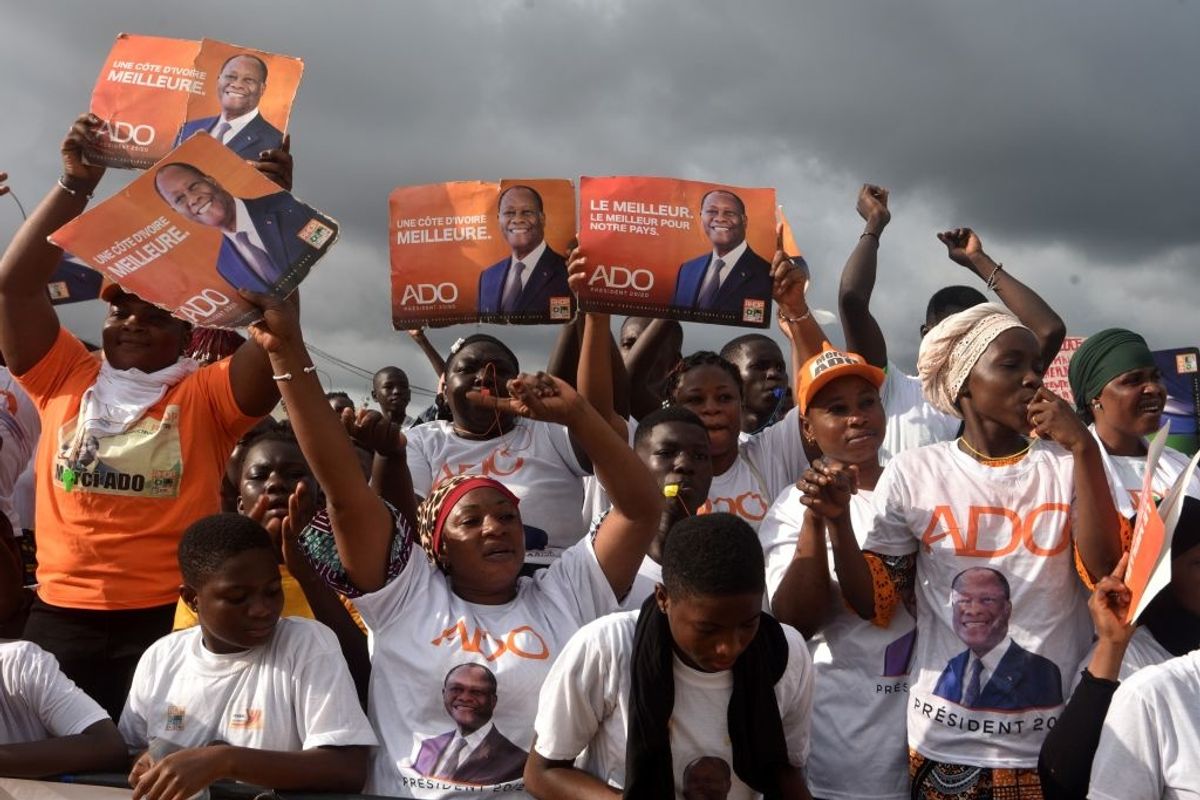Ivory Coast President Alassane Ouattara Controversially Wins Third Presidential Term
President Alassane Ouattara has secured a controversial landslide victory in Ivory Coast's recent national elections despite boycotts.

Supporters of incumbent president Alassane Ouattara take part in a campaign meeting ahead of the presidential election, on October 17, 2020 in Abidjan.
President Alassane Ouattara has reportedly been voted into his third presidential term in Ivory Coast. This comes after the national election took place on October 31st. According to Al Jazeera, votes for Ouattara amounted to 94.2 percent of the total votes. Opposition parties have reportedly refused to accept the election results along with majority of the country who boycotted the elections. Additionally, violence and unrest preceded the elections when the country opposed Ouattara's third presidential run. Ouattara now joins fellow East African President Alpha Conde, who recently won his own third presidential term in Guinea amid the loss of several Guineans' lives.
Ouattara's win was announced early Tuesday morning after all the votes were reportedly counted. Kuibiert-Coulibaly Ibrahime, the head of the electoral commission announced the results to the nation. The results are said to be validated by the country's constitutional council which will declare the final winner after hearing any challenges or complaints of irregularities. As a matter of fact, opposition parties have continuously called Ouattara's presidential campaign "illegitimate" because Ivory Coast's Constitution does not permit more than two presidential terms. Conversely, the 78-year-old president called it a "reset" for himself but voters have shown resistance.
The electoral commission confirmed that only 53.9 percent of Ivorians cast their votes at the poll. Ivory Coast's election can be said to have been strange, controlled and violent. According to DW, forty of the forty-four candidates seeking to challenge Ouattara were disqualified. Furthermore, two of Ouattara's three remaining opponents (Pascal Affi N'Guessan and Henri Konan Bedie) boycotted the vote and asked their supporters to stay at home as well.
According to DW, African Union observers called the election process "generally satisfactory". US international political and human rights organisation, Carter Center, questioned the credibility of votes with regards to Ivory Coast's current unstable political climate. At least 30 deaths have reportedly been recorded in demonstrations against Ouattara leading up to the elections. Ouattara's win is not unfamiliar. Recently, OkayAfrica reported on Tanzania's election where President John Magufuli won by over 84 percent. Opposition party figures were set to peacefully demonstrate against the results but were arrested prior.
- Deadly Clashes Between Protesters and Police Erupt in Ivory Coast ... ›
- Ivory Coast Will Host the Africa Cup of Nations in 2023 - OkayAfrica ›
- President Alassane Ouattara's Party Wins Majority Parliamentary Vote - OkayAfrica ›
- Ivory Coast President Removes Prime Minister and Dissolves Cabinet - Okayplayer ›
- Former Ivorian President and Minister Provisionally Excluded from Election | OkayAfrica ›

